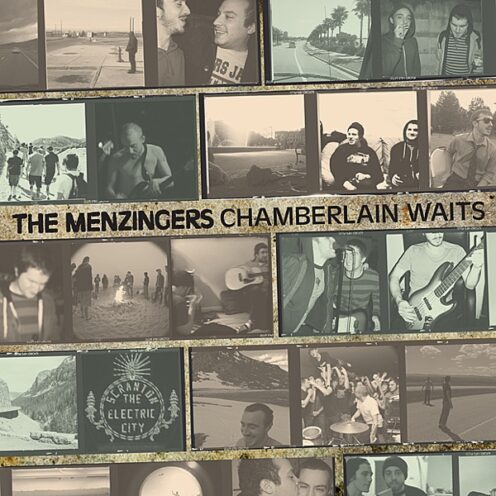
The 2010 comedy Date Night is about a couple’s wild journey into the city one evening where they continually run into obstacle after obstacle, essentially postponing their night of innocent fun and reigniting their love in the process. The 1977 comedy The Out-of-Towners contains a similar plot, however this time around, the couple are trying to survive the manic big city while sightseeing, eventually running into a slew of wacky characters all while reigniting their love in the process. Not quite the same, but enough for a viewer of both to notice the similarities.
The same idea can often apply to music. Despite the makeup of different individuals from different backgrounds, influence always tends to seep its way into just about any band’s music. It can be a positive and a negative. Positive, because it’s easy to relate to through familiarity; negative, because it can be skewed as plagiarism. The Menzingers are certainly not being accused of blatantly ripping anyone off, but on their sophomore release, Chamberlain Waits, the influences come up frequently, and it takes a bit of the sheen off the previous buzz that has been circulating over the band for the past year or two.
The first two songs in particular remind one of the Gaslight Anthem or Against Me, “Deep Sleep” contains verses that have slight resemblance to Tiger Army, and “Come Here Often” could have been an Anti-Flag/Dillinger Four collaboration. Naturally, influence is a common occurance and is more serendipitous than thievery. The Menzingers are young Philly kids who are going to leave their mark, and as lovely as Chamberlain Waits is in concept, it leaves something to be desired. The album isn’t their ’59 Sound or their Greatest Story Ever Told — but that isn’t to insinuate it’s a disaster. In fact, it’s a step in the right direction melodically, lyrically and a sure implication that the guys have found a niche in sincere punk rock without coming across as loudmouth scholars with a chip on their shoulder.
Produced by Matt Allison, who has worked with Alkaline Trio and Less Than Jake (just to name a few), the album feasts upon the band’s true strengths: songwriting and musicianship. Greg Barnett and Tom May swap vocal duties over the course of the record, and their voices are evidently strong — not just in terms of actual pitch, but in what they use their voices for. “Who’s Your Partner” is mid-tempo rock n’ roll highlighted by the calming melody that contains a perfect refrain: “Let the simple songs get caught in our heads.” Modest, light and, above all, honest, it’s what the Menzingers are influenced by and live by themselves. “I Was Born” rolls along at a feverish pace, like the best song Tom Gabel never got the chance to write, with Barnett candidly confessing his sins (“I was raised inside a Bible / I was living on life support”). The vocals might be a tad grating to some, but in this line of work, they’re bare essentials; it fits what they do, and Barnett’s wails stick out like a sore thumb… in a good way. “No We Didn’t” kicks out a memorable melody with a slam-bang vocal thrashing behind it, although it’s so damn enjoyable, you want more of it before it comes to a screeching halt; “Time Tables” has a wonderful distorted country riff that coincides with a steady drumbeat; “Male Call” is whiskey-soaked bar-room country punk, while the following track feels like it would be right at home on a Lawrence Arms record; and “Home Outgrown” is like Broadway Calls mimicking the Clash.
For longtime fans, it might be a jarring experience. The band obviously wants to move in a more melodically-balanced direction, but keep their aggressive punk roots. “Rivalries” and the title track are songs that demonstrate a band attempting to grow out of their comfort zone, and to some fans of their first record, it may sound like shlock that feasts upon the current “orgcore” trend. Truth is, it’s precisely what works for the band and as they build up their own trademark sound, it will all come together and allow the Menzingers to be admired rather than be influenced. Don’t mistake the criticism for stark dislike — Chamberlain Waits has promise, and grows with you (which is a testament to the band’s talents); it simply lacks its own distinct identity and with their next release, be prepared: the Menzingers will almost definitely be leaving Waits in its own dust.
 Time Tables
Time Tables